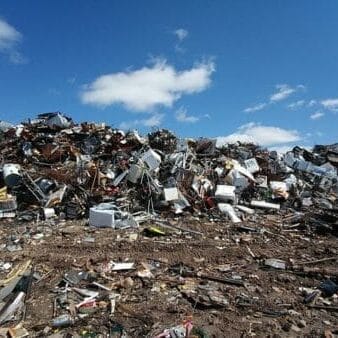The (legal) concept of waste: an obstacle for a circular economy?
Prof. Dr. R. Feltkamp and T. Hermans
31/01/2022

©JC Guillaume
Our 'take-use-dispose' consumption patterns are putting tremendous pressure on natural resources, the climate and biodiversity. So much so that they cause an ecological breakdown of such a scope that survival on and of our planet is seriously jeopardized.
Sustainable production and consumption patterns, which are taken up as goal 12 of the sustainable development goals (SDG), have already been called for by the international community since 2002, if not before. However instead of decreasing, material use seems to be increasing at a hallucinating pace and along with it also our waste footprint.
A fundamental reshaping of the production and consumption patterns is urgently required if we want to ensure sustainable living on our planet. Such reshaping may entail that certain of our production and consumption patterns are “exnovated”, i.e., abandoned. One of those patterns, requiring a fundamental reshaping or even an exnovation is the linear use of resources. The linear use of resources generates an unsustainable amount of waste for the environment.
In the context of the interdisciplinary ULB/VUB research project Gosete, financed by Innoviris Brussels (Belgium), the question arose if the legal concept of waste is an obstacle to the development of a circular economy and whether this notion can and should be adapted or taken out of the current regulatory framework, so that every product could be re-used, recycled and / or purposefully employed in a different manner.
In this respect, we prepared a contribution on “The (legal) concept of waste, an obstacle for circular economy activities (in the Brussels Region)?”.
In our contribution we provide, amongst others, an overview of the applicable legal framework (section II) before diving more in detail into the legal concept of waste (section III).
When addressing the legal concept of waste, we first address the legal “waste” definition of Directive 2008/98/EC on waste (the “WFD”) as interpreted by the European Court of Justice. Indeed, once a substance or a good qualifies as waste, the whole set of administrative and waste processing and management rules of the WFD apply.
Secondly, we address the notion of by-products, which are not considered waste and the « end-of-waste status”, which is a way of losing the waste status.
The main conclusions of our assessment are the following:
- Whether a material is to be considered as a waste, is to be determined on a case-by-case basis, taking into account the legal definition of waste in the WFD, the conditions under which a material can be considered a by-product pursuant to the WFD, and the question on whether the end-of-waste criteria are fulfilled.
- If a product is not a by-product, the legal definition of waste is determining for qualifying something as waste or not. Central to this definition is the intention of the holder to discard the substance or the object. This intention is to be deducted from the factual circumstances, implying that a holder of waste can express explicitly its intent to consider something as waste or not. In case the intention is clear not to consider something as waste, then the qualification of waste cannot be granted unless such qualification is imposed by law (or unless in fact the holder discarded it).
- The European Court of Justice defends a broad interpretation of the notion of waste arguing that it should be assessed considering the objectives of the WFD. However, the European Court of Justice mainly considers the initial objective of the WFD to ensure the “protection of health and environment”. Emphasizing more on the second objective of the WFD to also ensure “resource protection”, albeit taking into account the protection of health and the environment, could lead to an interpretation that is more in favor of circularity and increases the possibility of saving resources. Such interpretation would allow to consider that there is no intention to discard if it is clear from the factual circumstances that the holder re-uses or effectively intends to re-use lawfully the substance or object.
- Even if a substance or object is qualified as waste, it may be granted the end-of-waste status. This status was specifically introduced to allow for a more circular approach to resources use. However, the success of this status depends first of all on the right to this status and the establishment of end-of-waste criteria. The right to end-of-waste status is still not directly secured in the WFD because it is dependent on further implementing acts on European or member state level. Moreover, as long as no further implementing criteria have been set at European Union level, member states determine individually the applicable end-of-waste criteria, which may entail fragmentation in the applicable framework. For member states like Belgium, it even means that the framework can be fragmented amongst the regions. As a result, materials in one member state (or a region of that member state) may not be considered as waste due to the end-of-waste criteria scheme’s in that particular member state. However, if these same materials are shipped to other member states (or other regions within that member state) with a different regulatory approach, they might be considered waste and require waste management control, specific transportation, packaging, registrations, licensing or other administrative formalities, etc. This hampers the functioning of the internal market and puts an unnecessary strain on the transition towards a more circular economy. Setting forth further implementing criteria related tot the end of waste-status is therefore a necessary step in enabling a circular economy and in phasing out the linear economy.
- To the extent the commercial exploitation of substances and objects that qualify as waste is subject to compliance with specific administrative and other formalities and valorization processes, “waste-to-resource” activities are in practice reserved for certain operators specifically active in the waste sector. Therefore, authorities might need to consider investing more in the support of, or the deployment and making available of (public) facilities and infrastructures that facilitate and simplify access to these waste treatment services for certain types of waste for undertakings that wish to implement a circular business model.
